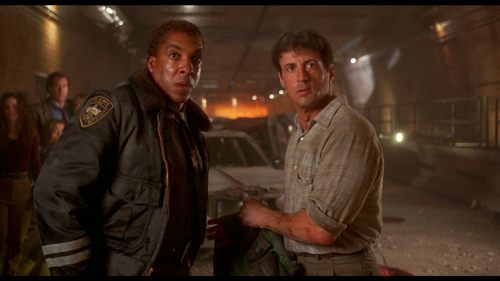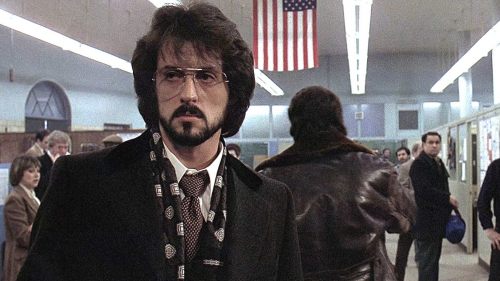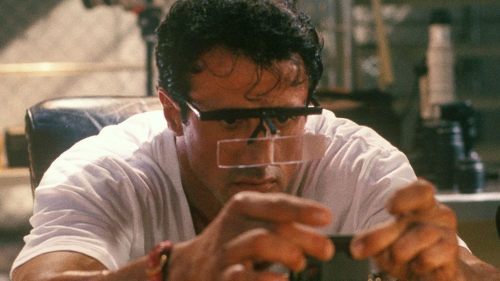CREED Review: The ROCKY Spin-Off Goes The Distance
The question of legacy hangs over Creed, both within the film and in a meta way, as the movie is a spin-off/sequel to the iconic Rocky franchise. Can young Adonis Creed, son of Apollo Creed, enter the family business and make his own name, be his own man? Can Ryan Coogler, director of Fruitvale Station, enter the Sylvester Stallone series and make it his own while still honoring what came before? The answer to both is an emphatic yes.
Apollo never knew about Adonis. The product of an affair, Donnie (as he’s called) was born after Drago killed his dad in the ring in Rocky IV. Adonis himself didn’t know his parentage for the first half of his life and, after his mother died young, he bounced in and out of foster homes and juvenile detention facilities. But all of that changes when Apollo’s widow discovers him at age 14 and takes him to live within the Creed mansion. Right at the beginning of the film the main conflict of Donnie’s life is established - he is a man trapped between two worlds, unable to fully find his place in either one. He goes undefeated in semi-legal bouts in Tijuana and returns to his financial sector job in the morning, Fight Club style, but he doesn’t fit in either place. At the Los Angeles gym festooned with his father’s image Tiny Duke - son of Apollo’s trainer Duke - won’t train him. At work he feels boxed in. And so he quits his job, packs his stuff, and moves to Philadelphia to find his father’s best friend and titanic tussling partner, Rocky Balboa.
Creed hits many of the same beats as Rocky, but it does so cannily, and with great respect for the characters. Rocky may have ascended to the role of trainer/father figure once filled by Mickey, but he’s no Mickey. And Adonis may be the up-and-comer getting a once-in-a-lifetime, largely unearned shot at the champ, but he’s no amiable Rocky Balboa. And the setting may once again be Philadelphia, but this isn’t the working class Italian world of 1976 but rather a beat-infused black city.
That’s part of how Creed brilliantly recognizes its legacy while staking out its own ground; Coogler and co-writer Aaron Covington understand what it is that we love about Rocky and the Rocky films, and they give us those things, but at the same time they recognize that this cannot just be Black Rocky. As they come around to the bits that you want from a Rocky film - the montages and the underdog will to succeed and the surprisingly touching and human romance and, eventually, the glorious Bill Conti music - they are careful to make their approach their own.
Part of that approach is represented visually. Rocky and Raging Bull have, for decades, defined how boxing is approached cinematically. Coogler clearly saw a challenge here, and he stepped right up to it. Coogler’s camera gets not just into the ring but between the two fighters, weaving in and out with them, going in long takes that highlight the brutality and physical intimacy of the match. There’s one match in the middle of the film that is shot in a single, long take, but it isn’t that showy Innaritu style of oner - rather it’s a cumulative oner, a shot that never announces its length but kind of creeps up on you. There was a point in the fight where I realized Coogler hadn’t cut, that this was playing out in real time, and I was thrilled. This is what I want from filmmaking: bold style that doesn’t strut around announcing its boldness.
Coogler’s style permeates the whole film. If the narrative beats recall the previous films in the franchise the visual language is totally modern and its own beast. That doesn’t mean Creed is a nightmare of whiplash editing, but it’s certainly got more verve than John Avildsen’s original film, which was based in a more social realist mode. The film truly comes alive in the ring, and Coogler uses fun on-screen text to introduce each fighter as Adonis meets them. It’s a small flourish, but it’s one that helps the film announce itself as of the moment.
The movie floats like a butterfly, visually, but it truly stings like a bee emotionally, and it does that through a trio of extroardinary performances and some wonderful writing that gets the Rocky Balboa character correct on a fundamental level. To be fair it probably helps if you’re already in the bag for this world - I teared up watching Rocky pull that folding chair out of the tree next to Adrian’s grave, with Paulie’s new tombstone beside his sister’s - but even if this were your first foray into Rocky’s Philly I think the characters will speak to you.
Michael B. Jordan is the shining center of the movie. Adonis may be the offspring of Apollo and a mistress, but he feels more like the genetic mash-up of Apollo and Rocky. Quick to anger, Donnie is nevertheless sweet and hardworking. He doesn’t have the cocky self-assurance of his father, but he also is more driven than the almost terminally laidback Balboa while still having that need to prove himself that made the original Rocky so affecting. When the hero’s goal isn’t to win but simply to prove that he deserves to stand in that ring it’s very easy to get behind him totally.
Donnie has a short temper but also an expansive smile. He has a relationship with a singer that is every so slightly awkward and absolutely sweet; this kid is the buffed out son of a multi-millionaire but he still approaches this woman with a borderline aw shucks attitude; his willingness to be kind and supportive to his girlfriend only makes Adonis that much more masculine - he doesn’t need to act like a dipshit alpha male to prove it.
Jordan’s star power pulsates from the screen, and he brings Donnie through a host of emotions quietly - he is confused, he despairs, he is driven, he is in love - but he also brings a swagger that stands just this side of cocky. You like Jordan, and when he ends a run with a gang of dirt bikers circling him in the middle of the street - his own top of the art museum steps moment - you are in love with this guy fully. It’s not a moment of braggadocio, but it is the work of a showman. He has his dad’s sense of show and his uncle’s sense of decency.
Tessa Thompson plays Bianca, Adonis’ love interest. Their meet-cute involves her playing music way too loud at 3 am; she’s a singer who has degenerative hearing loss. In many ways that makes her and Donnie perfect for each other - they’re both pursuing careers they love that they understand will destroy them. What’s wonderful is the way that neither of them tries to stop the other - there are no long scenes of Bianca attempting to convince Adonis that boxing will leave him brain damaged (his adoptive mother does that pretty well all on her own at the beginning), and Adonis never questions the wisdom of a woman whose ears are failing her playing loud clubs.
I fell in love with Thompson in Dear White People, and she brings the same righteous energy she had as Sam White to the role of Bianca. She’s sharply funny and smart, and Thompson gives her a take no shit attitude that instantly endeared her to me. Bianca isn’t a helpless girlfriend or a shut-in like Adrian - she’s her own person, with her own interests and dreams, and part of what attracts her to Donnie is that he’s as driven as she is.
The third major player in the film is Sylvester Stallone, in his seventh outing as Rocky Balboa. The series has done something intriguing with the character - it has returned him to his roots. Rocky’s dotage is humble, as we saw in Rocky Balboa, but more than that it’s lonely. One of the aspects I loved about the character in the first film was his loneliness; he wasn’t looking for a title fight, he was looking for someone with whom to share his life. The love story between Adrian and Rocky is, to me, the spine of the series, and her absence loomed large in Balboa. Now, years after that, Rocky is absolutely alone as even his best friend, the incorrigible fuck-up Paulie, has died. He’s back where he started - living in a row house, all by himself, head down, just making it through the day. Into this world comes Adonis.
Stallone has always been a great actor given to making bad decisions. Coogler coaxes that greatness from him again, and Stallone delivers a performance that must put him in the awards race conversation. Rocky is one of those old men who no longer know why they’re alive - everyone they loved is gone, their bodies don’t work anymore, the world has left them behind - and he’s just waiting to die. He’s ready to go. Every time he pulls that chair out of the tree he’s imagining the tombstone collection complete, his own name etched in marble next to Adrian’s. Rocky feels like he’s gone the distance, and he’s waiting for the bell.
And then Adonis shows up. This kid Rocky didn’t know existed, this kid who reminds him of a great friend, a kid who reminds him what it’s like to have his blood pumping. This kid who won’t go away, no matter how much Rocky tries to assure him that he’s no trainer. This kid who convinces Rocky that he’s got more rounds ahead of him.
The relationship between Adonis and Rocky is beautiful. Legacy comes in again - in his twilight years Rocky wonders what he has left behind. Is it a statue in front of a museum? Some videos of famous matches forty years old? His son is out there, but he’s moved not just away from Philly but away from America, and they’re no longer in touch. Enter Adonis, a son without a father meeting a father whose son doesn’t understand him. And this becomes Rocky’s legacy, this new fighter proving his worth in the ring. This is what makes the living he still has worth it, that there’s a new person in his prime, someone Rocky can help and shape as Mickey helped and shaped him.
I remember when I first heard that Creed was happening, and the idea of Rocky becoming Mickey was just so perfect that I knew this film was coming from the right place. What I couldn’t have known was just how great the actual film would be, what a deeply touching, moving and inspiring experience it would be. I couldn’t have known that I would have sat in the theater, cheeks wet with tears, heart racing with the intensity of the final match. I couldn’t have known that Ryan Coogler understands Rocky Balboa as well as as Sylvester Stallone (maybe even better, because Stallone wrote the very un-Rocky Rocky IV), and that he would establish a new hero who is markedly different and yet rooted in the same decency and humanity that has made us love Balboa for forty years. I couldn’t have known that Michael B. Jordan would bring fierce life to this guy, making him as real in the ring as he is in the quieter moments. I couldn’t have known that Sylvester Stallone still had it in him to deliver shattering monologues that lay himself bare. I couldn’t have known that Creed would be one of the greatest movies of the year.



